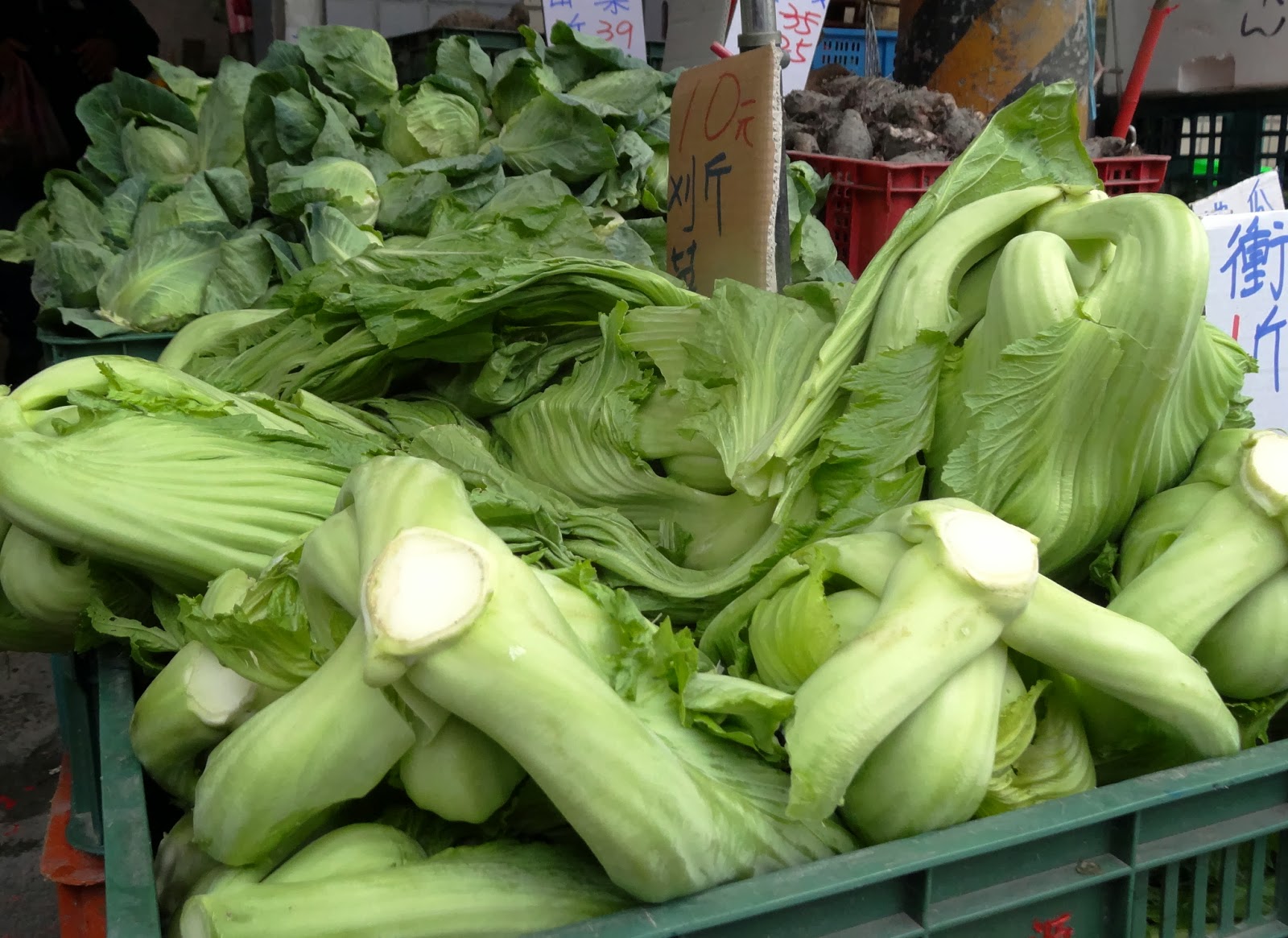Donghu Road market is just over the road from Donghu MRT station, and the stallholders are all locals hoping to make a decent living by selling good quality produce to discerning Taiwanese shoppers. Over our time living in Taiwan I've enjoyed many local foods in restaurants but I'm still not very familiar with them in their uncooked form, so it was with interest I joined a small class on shopping in a wet market.
Some things were already very familiar, such as the king/queen of vegetables in Chinese cooking - baicai, 白菜, or white cabbage. This vegetable is so adored it's a frequent subject of intricate jade carvings and other artwork, representing fertility and abundance. Another vegetable I've been pleased to make the acquaintance of is hongcai, 红菜,or red vegetable. I bought some of this fresh from the field once on a trip through the mountains, incredibly cheaply. Its deep purple colour indicates it's full of iron, and so is thought of as good for women to eat.
No wet market would be complete without delicious baicai.
Hongcai's rich colour indicates it's bursting with vitamins and minerals.
By contrast, our guide also introduced us to niubang, 牛旁,or burdock, which is, predictably, thought of as a man's vegetable.
Some vegetables were completely unfamiliar, such as roudou or 肉豆. It has no English name, but translates literally as meat bean, and is named for its rich texture.

Roudou is the red bean in the foreground. It's eaten whole. I don't recall ever eating this.
Caigua, 菜瓜, or vegetable loofahs are the same as the thing you scrub your back with in the bath, before they have rotted and dried out. Eaten fresh, I have to admit I don't particularly like this vegetable's watery, slightly slimy taste.
Another very popular vegetable I used to only ever encounter in another form is jiecai, 芥菜, or mustard. Insanely popular as a fresh vegetable, you can eat its leaves or its stalk, or both together.
I mustn't forget to mention at least two of Taiwan's delicious fruits. At this time of year, there's a limited selection of local fruit available, but two particularly tasty ones are zaozi, 棗子, or jujubes, and lianwu, 連霧, or wax apples.
Zaozi are similar to apples but have a large seed instead of a core. They're also lighter and crisper than apples.
Lianwu are also very light, fresh and juicy, but have a slightly bitter skin.
Fungi play a big role in Chinese cooking, and there are many varieties available. Drying mushrooms concentrates their flavour, and at Chinese New Year boxes of them are commonly given as gifts.
The NT$200 price tag for this bag is equivalent to about £4. Next to the mushrooms is a bag of dried chrysanthemum leaves.
Similar to other countries that experience changing seasons, Taiwanese and Chinese cooking uses dried, pickled and salted foods during the coldest months of the year. These piles of white strips are dried, salted bamboo shoots:
Something I eat for breakfast when I meet with my friend for language exchange was also on sale. Breakfast shop food isn't the healthiest in the world, but luobogao, 蘿蔔糕, or radish cake, isn't too bad.
Taro cake is to the left, radish cake in the middle and, I think mochi - a kind of glutinous rice paste - with seasoning bags is on the right. Sliced and fried, radish cake is tasty and filling.
I haven't mentioned a tenth of the goods on sale at Taiwanese wet markets. Fresh meat and fish figure hugely, and cooking staples such as many varieties of rice wine and soy sauce are also sold. Full of high quality, very fresh produce, the only problem with visiting a wet market in Taiwan is that you'll end up buying more than you can possibly eat.










4 comments:
菜市场 should be the word for wet market in mandarin, yes?
I'm not sure tehooo. My Taiwanese friends said they would just call it a market, or maybe a morning market.
菜 means vegetable, 市場 (or in simplided writing 市场) means market.
Thanks, Hanatha, my Chinese is good enough to understand tehooo's characters. Although I included mostly photographs of vegetables, this market and others also sell a wide range of fish and meat, so I'm not sure calling it a vegetable market would be correct.
Post a Comment